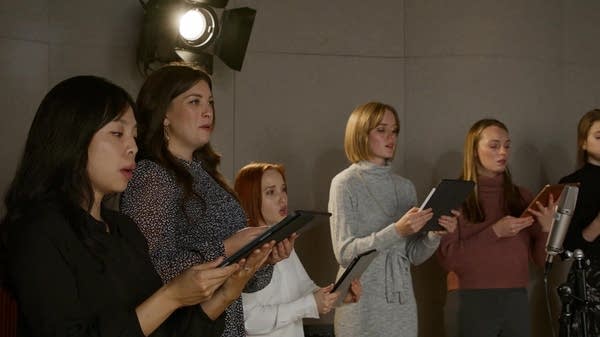Sociologists speak of class envy, students of grade envy and Freudians of penis envy. But in the choral world (and what is the choral world, after all, but a trembling microcosm of the very world itself?), it's tenor envy that seethes just beneath the surface, erupting now and then in sometimes cruel, other times amusing ways.
Of course, these outbursts never divulge their real motivation. They're always whinily veiled as issues of tenor performance: "The tenors were so loud I couldn't hear myself sing!" Or some variation on the familiar, "Tenors who can't hit the high notes are just dragging the rest of us down to their level," as though slipping intonation were tantamount to slipping into squalor. Over time, any alert tenor (in other words, any tenor) comes to see these critiques for what they really are: unfounded, resentful potshots, oozing green.
Grandiosity is the charge most often leveled against Men Who Sing High Notes. In opera, tenors are duly famous for the grand gesture, whether necro-dramatic (Rodolfo sobbing over Mimì's corpse, Othello strangling Desdemona before killing himself) or chiefly musical (the nine thrilling, bass-shaming high Cs that pepper Ah! Mes Amis! from Daughter of the Regiment).
Choral tenors feel a kinship with their operatic brothers, to be sure, but most would never, ever presume such stage-stealing in an ensemble. Quite the opposite — trust us! Yet this is the very straw man that basses, altos and sopranos routinely prop up when trying to take tenors down a few notches.
"We're a choir," they fume. "This isn't La Scala."
Among sections, the basses are probably the most defensive when it comes to the T in SATB — and one can easily understand why. What's almost touching — or would be touching if it weren't somehow so sad — is how basses inevitably turn their musical differences with tenors, where they usually have no leg to stand on, into questions of relative manhood, where America's NFL-addled culture assures them they'll prevail.

Puh-leez, guys. Low notes don't make you James Bond! Luciano Pavarotti played rugby. Mario Lanza drove a truck. John Vickers was a speed-skater when he wasn't creaming opponents on the football field.
You might suppose that tenors and altos would get on well. We're the middle children in the choir family, after all, and share some delicious overlapping range. But you'd be wrong. Dead wrong. Despite tenors' politic attempts to find common ground, altos, with rare exceptions, snub all such overtures.
Oh, they're gentle about it at first, in that earth-motherish way they cultivate, but a hidden alto trait — bloodthirsty competitiveness — always surfaces. They view tenors as rivals in a turf war. Part of this originates in an abiding misperception that altos have of tenors, whom they regard (as they regard themselves) as fellow keepers of the choir's "inner voices" — the meat of the sandwich; the rich, boozy filling in the chocolate truffle. Naturally, they don't want to yield too much of it.
But tenors — are we really an inner voice? Not that there's anything wrong with inner voices. What would the sopranos and basses do without the altos to mitigate their excesses? But let's face it, tenors command a vista, indeed a dimension, extending far, far beyond the confines of the soprano/bass continuum. If altos would simply understand this, they might save their rancor for the sopranos.
And hello, the sopranos could use some competition. Do we even need to go there? The melodrama, the narcissism, the caterwauling? They're not called called "divas" for nothing.
I heard a soprano dress down an unsuspecting tenor once at a rehearsal break — a sweet young guy who'd had the temerity to ask her out for coffee. After a few token niceties, she went right for the jugular on his golden, dulcet throat. He was "arrogant"; he was "paranoid"; he was "grandiose." This from a soprano! A pall fell on the choir room when at length this solitary tenor, eyes glistening, stood and broke into an unaccompanied Una furtiva lagrima so moving that even the basses' Neanderthal jaws dropped. The soprano flipped her hair back, put her head down and fled the room in shame, vanquished.
Despite what you doubtless think, tenors aren't perfect — they're the first to let you know on those blue, blue moons when they fail their own sublime standards. And they attract imitators and wannabes who sometimes imperil their reputation: baritones who can't quite cut it, contraltos who presume mere vocal range gains them admission into the tenor sanctum. Then, too, there's that problematic tenor subspecies: countertenors.
Now, I've known a few countertenors. They can be nice people. True, conversation with them is sometimes hard work. There's a certain exotic self-regard you need to screen out, much as one requires sunglasses at celebrity parties in L.A. to soften the glare off the pool and guest list. And, in fact, countertenors are a kind of celebrity. Americans have always had an abiding fascination with sideshows.
No, it's not the "tenor" in "countertenor" that grates, but the "counter." Counter this, counter that — nothing's ever good enough for them, until they need their less-vaunted tenor brethren to bail them out of a tight spot. And because countertenors don't think that the laws of time and space — let alone vocal production — apply to them, it seems they're always in a tight spot.
Tenors don't really mind. They're used to bringing everyone else along even as they're being scorned, scapegoated and envied for doing so. They take it for the team. Leadership has its price. Noblesse oblige. But it would be nice every once in a while if someone said thank you.
Love the music?
Show your support by making a gift to YourClassical.
Each day, we’re here for you with thoughtful streams that set the tone for your day – not to mention the stories and programs that inspire you to new discovery and help you explore the music you love.
YourClassical is available for free, because we are listener-supported public media. Take a moment to make your gift today.









